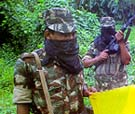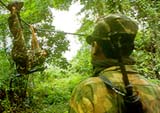The Rediff Special
Days of the Guerrillas
The rise, fall and rise of ULFA
 On April 21, 1979, a few starry-eyed men gathered at the Rang
Ghar, an entertainment theatre in the ruined palace complex of
Sibsagar, once the seat of Assam's mighty Ahom kings. The palace
symbolises a fiercely independent era in Assamese history, and
the men had gathered there to pledge their lives for the cause
of Assam's freedom. That day, 18 years ago, the United Liberation
Front of Assam, or ULFA, was born.
On April 21, 1979, a few starry-eyed men gathered at the Rang
Ghar, an entertainment theatre in the ruined palace complex of
Sibsagar, once the seat of Assam's mighty Ahom kings. The palace
symbolises a fiercely independent era in Assamese history, and
the men had gathered there to pledge their lives for the cause
of Assam's freedom. That day, 18 years ago, the United Liberation
Front of Assam, or ULFA, was born.
Today, that fledgling front has grown into one of the toughest
and richest insurgent groups in the North-East, keeping the government
and the powerful Indian army constantly on tenterhooks.
According to army sources, ULFA presently has about 1,250 hard-core
cadres, backed up by a body of sympathisers. About 450 of them
are believed to be absconding in their hideouts in neighbouring
Bhutan. Many ULFA guerrillas have received military training from
the rebel groups of Burma.
ULFA is concentrated in the upper Assam districts of Tinsukia,
Dibrugarh, Sibsagar, Jorhat, Nagaon, Lakhimpur, Sonitpur, Darrang
and Barpeta on the north and south of the Brahmaputra river. These
districts also happen to be Assam's main tea-growing areas. The
insurgent group is said to have divided the state into four sectors,
and operations in each are overseen by one regional commander.
Each region has a battalion of guerrilla fighters.
The party is run by a quartet comprising chairman Abrabinda Rajkhowa,
general secretary Anup Chetia, vice-chairman Pradip Gogoi, and
commander-in-chief Paresh Barua. The former three were, at one
time, willing to discuss peace with the Centre, but Barua refused
to compromise, made the others toe his line, and rebuilt the organisation
after it was virtually decimated in successive army operations
in the early nineties. He, however, still remains number four
in the party hierarchy, but is the most wanted man from the government's
point of view.
ULFA's avowed aim is to create an independent and sovereign state
of Assam. It believes that Assam was never a part of India before
it was annexed by the British. And since 1947, it claims, Assam
has been reduced to an Indian colony whose natural resources are
being looted.
The outlawed organisation had always maintained close links with
the Asom Gana Parishad and the All Assam Students Union
which shot into prominence in the early eighties through
its violent anti-foreigners (read anti-Bengali) agitation. However,
ULFA has never betrayed any overt ethnic bias.
If anything, it tried to base itself, at least initially, on Maoist
principles of fighting a protracted guerrilla war and carrying
on mass activities in rural areas. This policy paid rich dividends.
By the late eighties, it virtually ran upper Assam through an
elaborate network of social organisations. But a spate of killings
in 1989-90 invited an army crackdown.
 In the next two years, ULFA was -- or so it seems -- completely
routed by Operations Rhino, Bajrang and Golden Bird. Many of its
cadres were killed, many more were jailed, and others simply lost
the nerve to keep up the fight. But Barua and the rest of the
top leadership managed to elude the dragnet, and set about regrouping
after the army operations were put on hold by the Congress government,
headed by Hiteswar Saikia, that came to power in 1991.
In the next two years, ULFA was -- or so it seems -- completely
routed by Operations Rhino, Bajrang and Golden Bird. Many of its
cadres were killed, many more were jailed, and others simply lost
the nerve to keep up the fight. But Barua and the rest of the
top leadership managed to elude the dragnet, and set about regrouping
after the army operations were put on hold by the Congress government,
headed by Hiteswar Saikia, that came to power in 1991.
In the last assembly election in 1996, ULFA tacitly backed
the AGP, helping it to return to power with a massive majority,
hoping that the AGP would withdraw the Armed Forces Special Powers
Act that gave the army sweeping powers to fight the insurgency.
But relations between them soured quickly, as the AGP government,
headed by Chief Minister Prafulla Kumar Mahanta, formed a united
command of security forces comprising the army, police and the
paramilitary to check ULFA and Bodo violence.
Now, with the government stepping up its campaign, ULFA faces
a new challenge. And so does the government.
Kind courtesy: Sunday magazine
Tell us what you think of this feature
|



